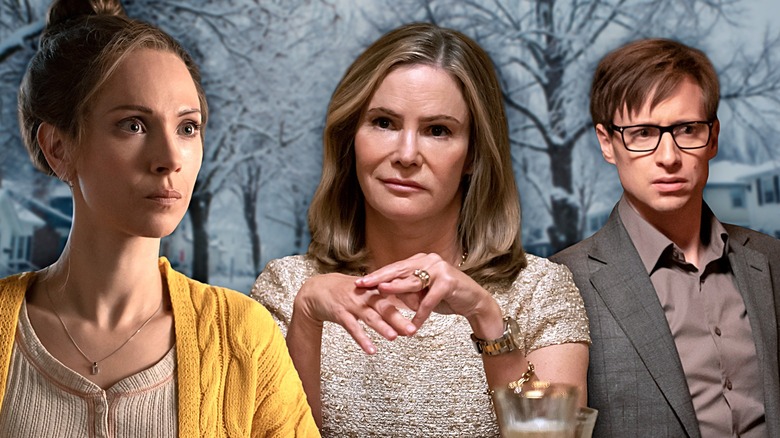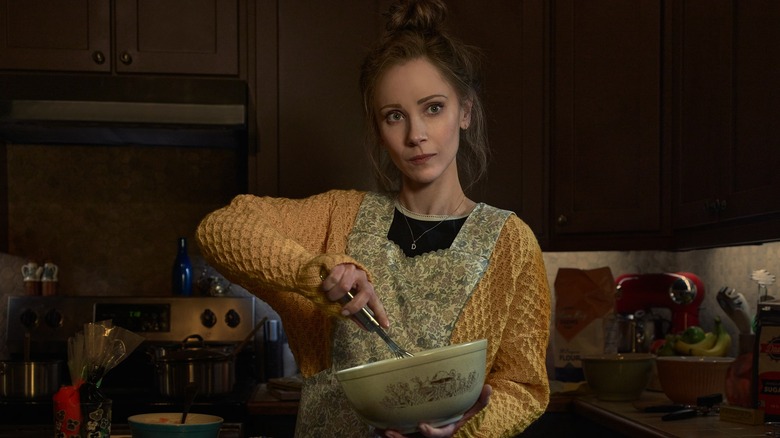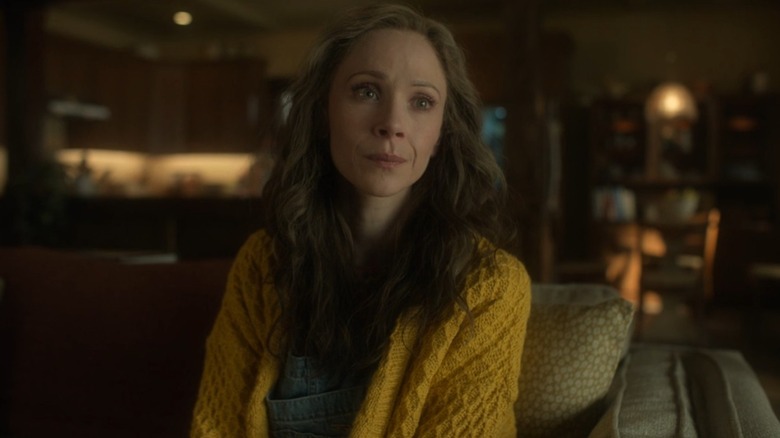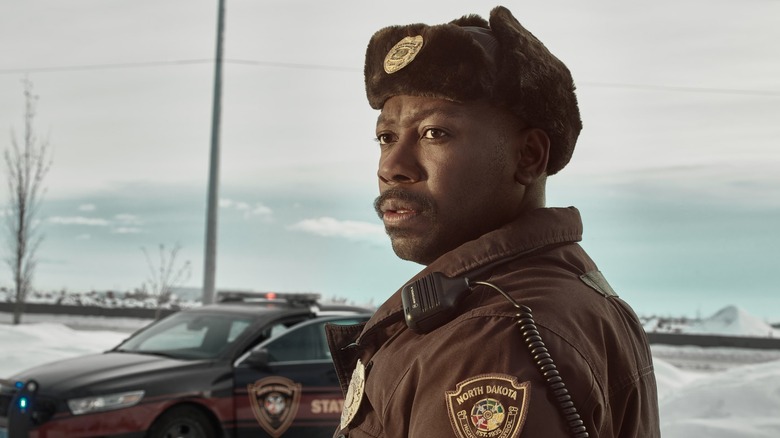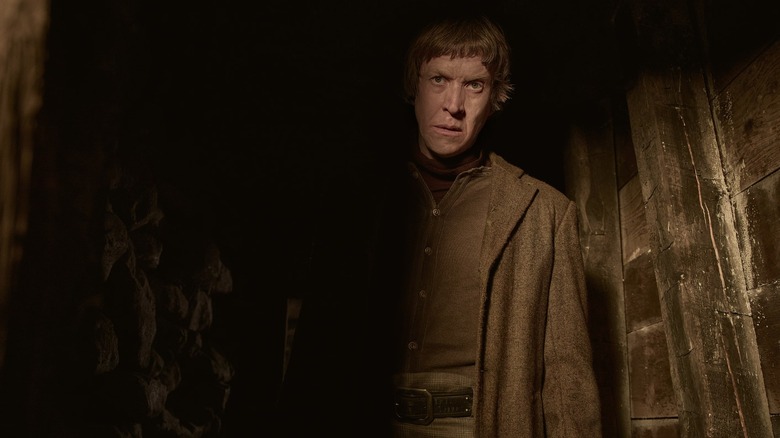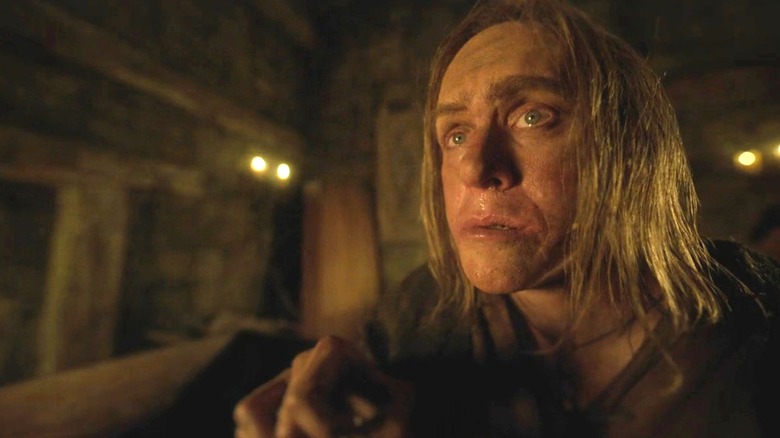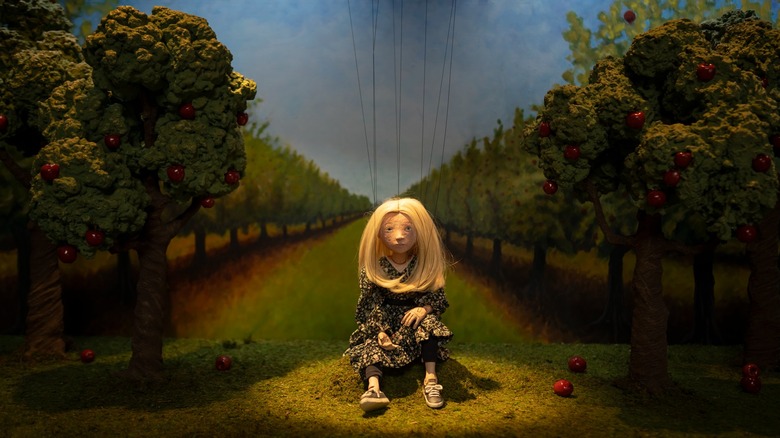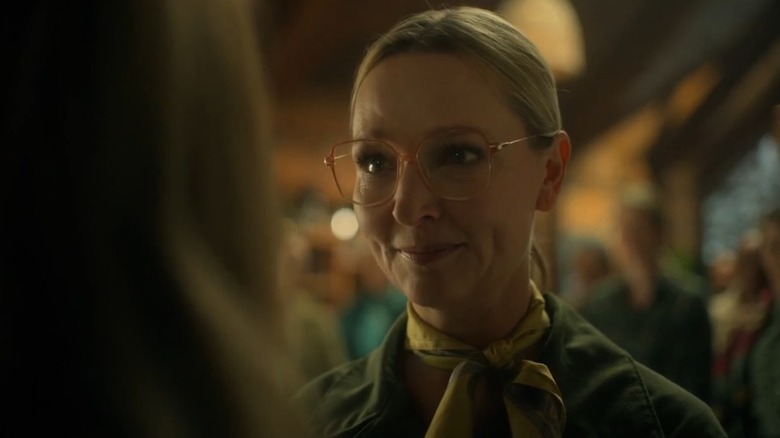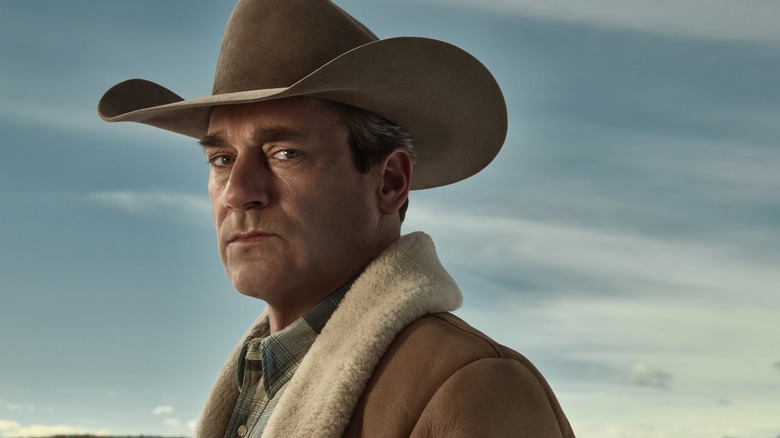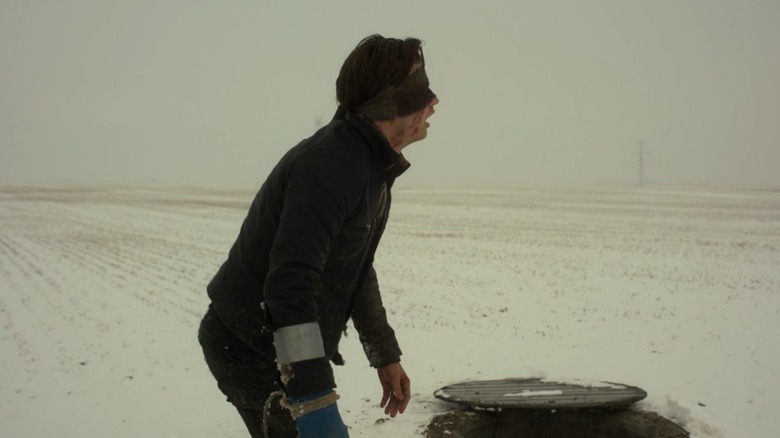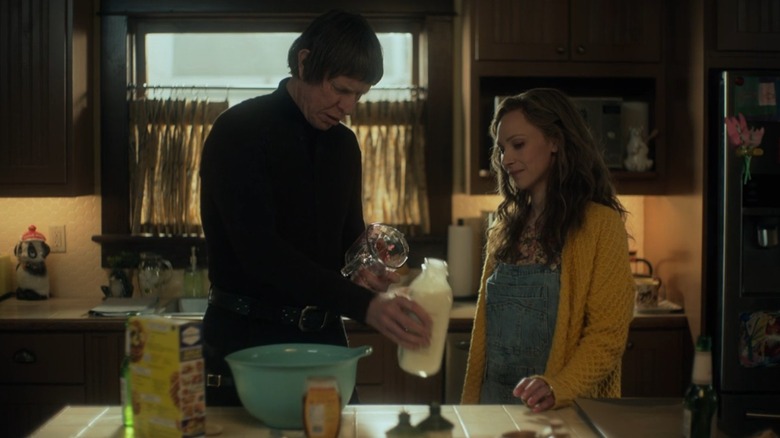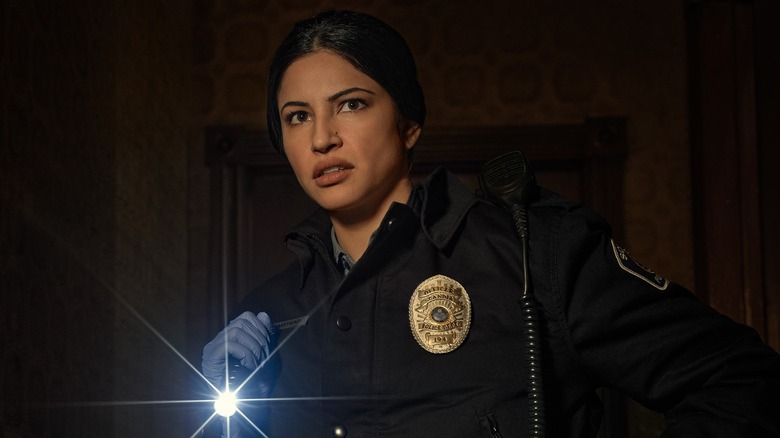The Ending Of Fargo Season 5 Explained
Contains spoilers for "Fargo"
If you thought the first four seasons of "Fargo" were strange, you haven't seen anything yet. Sure, the previous seasons involved UFOs and fish raining from the sky, but Season 5 of "Fargo" goes to some pretty bizarre places, including a bunch of thugs in "The Nightmare Before Christmas" costumes and a 500-year-old man who likes pancakes. And that's without even getting into the creepy puppets.
After watching the newest season, you may have questions. Like, why does Sheriff Roy Tillman (Jon Hamm) turn his back on his son? Did the heroine's fantastical journey to Camp Utopia actually happen? And what's the deal with Ole Munch (Sam Spruell)? "Fargo" has a long tradition of mysterious characters like Lorne Malvo (Billy Bob Thornton) and V. M. Varga (David Thewlis), but Ole Munch might just take the cake — or rather, the biscuit.
Here's everything you need to know about the ending of "Fargo" Season 5.
What you need to remember about Fargo Season 5
In 2019 Minnesota, a hitman-for-hire named Ole Munch kidnaps Dorothy "Dot" Lyon (Juno Temple) from her home. However, he underestimates Dot's will to get home to her daughter Scotty (Sienna King) — she slices Munch's ear with an ice skate and escapes. When the police come to investigate, Dot denies that she was ever kidnapped. Instead, she plays dumb and won't even tell her husband Wayne (David Rysdahl) what happened. This seems suspicious to police officers Indira Olmstead (Richa Moorjani) and Witt Farr (Lamorne Morris), especially since Farr witnessed Dot's kidnapping.
Viewers soon learn why Dot was afraid to let the police get involved. Thanks to Dot's last encounter with the police, Dot's abusive ex-husband Roy Tillman was able to access her fingerprints and discover her whereabouts. Roy is the sheriff of an extremist North Dakotan community that treats women as property, and he believes Dot (who changed her name from Nadine to Dot after she fled) is rightfully his. He is the one who ordered the kidnapping.
Eager to prove himself, Roy's son Gator (Joe Keery) tries to capture Dot. When Dot outsmarts Gator with a booby-trapped house, Gator feels like a failure. Meanwhile, Roy refuses to pay Ole Munch for his work, and the hitman vows revenge. With nowhere else to turn, Dot leaves Scotty in the care of Indira, promising she'll be back after she deals with Roy.
What happens at the end of Fargo Season 5?
As Dot confronts her past, viewers learn that she was taken in as a teenager by Roy and his first wife Linda (Kari Matchett). Roy was cruel to both of them, as well as his son Gator. Desperate to escape, Linda groomed the young Dot to be Roy's wife so she could flee.
Meanwhile, Roy finally decides to pay Ole Munch his due, deciding it's not worth risking the hitman's wrath. Yet Gator disobeys his father and provokes Munch further. In response, Munch kidnaps Gator, gouges out his eyes, and dumps him at his father's feet, knowing it will humiliate Gator and disappoint his father.
After Dot is injured in an accident, Roy poses as her husband and drags her back to his ranch, where he keeps Dot chained up. However, Roy soon realizes that his ex-wife will never stop fighting him. After learning what happened to Dot, Witt Farr brings in government forces to raid the Tillman ranch. In response, Roy rallies his hometown to fight back, though he knows he cannot win. Soon Dot escapes and brings Roy to justice (though not before Farr dies protecting her). Along the way, Dot forgives Linda and Gator, whom she realizes were victims too.
One year later, Ole Munch tracks down Dot, seeking revenge for the injury she gave him when he tried to kidnap her. Instead, Dot convinces Ole Munch to let bygones be bygones and invites him to eat biscuits with her family.
If you or someone you know is dealing with domestic abuse, you can call the National Domestic Violence Hotline at 1−800−799−7233. You can also find more information, resources, and support at their website.
Crushing with a helping hand
Each character in "Fargo" Season 5 has their own perspective on law enforcement and the purpose it should serve. Dot's wealthy mother-in-law Lorraine (Jennifer Jason Leigh) sees the police as merely "gatekeepers" to keep the rabble in line, claiming that otherwise, they're useless. (Later in the story, however, she has a change of heart: She uses her clout as a billionaire to protect the "rabble" she formerly despised, pulling some strings to orchestrate Dot's rescue.) Meanwhile, Roy Tillman believes his job as sheriff is to uphold what he believes is right, regardless of whether or not it's the law. "I am the law of the land," he declares.
Dot doesn't trust the police because she knows Roy is a sheriff and he has eyes everywhere. The only person she can count on is herself. However, Deputy Witt Farr can't grasp why Dot won't tell the police what happened or even give her his name. Only after the standoff at the hospital does he understand why Dot was so afraid to ask for help. He catches Roy holding Dot hostage and tries to intervene, but his efforts almost make things worse. Farr vows not to make this mistake again. So when he leads a team to rescue Dot, he warns them not to shoot at her just because she's holding a gun. "This story will not end with us crushing the victim with a helping hand," he says.
Why does Ole Munch call the old lady 'Mama'?
After foiling Roy's attempt to kill him, Ole Munch holes up in the home of an old lady named Irma (Claire Coulter). When Irma discovers him, Munch simply says, "I live here now." Later, in a surprising moment, Munch calls her "Mama."
Irma is not Munch's actual mother (his birth mother is long gone) — she is just somebody he latches onto. Actor Sam Spruell told TV Insider, "I think he moves in with that woman who's equally damaged, who's equally abused in the hope that ... maybe they can look after each other."
Yet Irma adopts him just as much as he adopts her. Irma almost calls the police on him, but she changes her mind. It seems she is looking for companionship, something her own son doesn't give her. Irma's abusive son feeds off her disability money and only shows up when he wants something from her. This may explain why Munch strikes down her son with an ax. "Her own son has spit the nipple from his mouth," Munch says of him. Since Munch has gone for years and years without any maternal figure in his life, he feels Irma's son is ungrateful.
After Gator kills Irma, Munch snaps. Her death sends him into a destructive spiral that only ends once Dot begins to fill that mother-shaped hole in his life.
What's with the flashback to 500 years ago?
One moment from Episode 3 shows us a flashback of the Welsh countryside, with a title card telling us it is the year 1522. We see a man who looks an awful lot like Ole Munch participating in a religious ritual that involves eating bread beside an open casket. What the heck is going on?
"Fargo" shows us a real-life practice known as "sin-eating," which was believed to absolve the dead person of any sins. Desperate poor men would agree to eat the sins of recently-deceased wealthy men, in exchange for food and a few coins. As a result, sin-eaters like Munch would be ostracized by society, weighed down by sins that weren't even theirs, while the rich man's reputation would be clean. "He really is a kind of manifestation of America's underclass," Sam Spruell explained to Wide Open Country. "Someone trapped in a cycle of criminality and poverty that they can't escape."
And yes, Ole Munch is immortal. Although the flashback is ambiguous about whether we are looking at Munch or his ancestor, the final episode all but confirms that he's lived for centuries. In fact, it all started when Munch became a sin-eater, a choice that condemned him to hell on Earth.
Some viewers have pointed out that Munch's name might be a charactonym that describes him perfectly. He's "ole" (hundreds of years old, to be exact) and he "munches" on the sins of others.
More than one kind of debt
Debt is a recurring theme in this season of "Fargo," whether it's Indira's growing pile of bills or the figurative debt Roy feels he is owed after Dot promised to be his wife. The series hints that debt is just another wall between the haves and the have-nots. Showrunner Noah Hawley told TV Insider, "What the rich do to the poor is they make them feel like it's their fault they're poor, and that if these poor people have to borrow money from us, it makes them less than." This struggle is exemplified in Ole Munch. For centuries, folks like Munch have been doing the dirty work for the rich, whether as sin-eaters or hitmen. And with each sin that Munch commits so men like Roy won't have to, the weight on his shoulders grows heavier. "He's kind of trapped in a cycle," Sam Spruell told Den of Geek. "He can't escape sin."
Wayne might be the only character who sees a way to escape this cycle. When a down-on-their-luck family wishes to sell their rundown vehicle and buy a much more expensive car, Wayne lets them do a simple trade, "a car for a car." Wayne's colleague Daryl (Sean Tyler Foley) tries to explain that the family has a low credit score. Yet Wayne overlooks their debt and gives them the car anyway because he knows it will help them, suggesting that maybe the world would be a better place if more debts were forgiven.
Is Camp Utopia real?
On her way to face Roy, Dot seems to arrive at a secret village called Camp Utopia. It's a place founded by Roy's first wife Linda after she fled, a place where domestic abuse survivors can heal by sharing their stories and re-enacting them with puppets. Dot is still mad at Linda for abandoning her and insists that she doesn't need any puppets because she has put all that trauma behind her. Dot is wrong, however, and only when she tells her story through puppets does she finally experience catharsis.
Unfortunately, Camp Utopia doesn't exist. Instead, it's revealed at the end of Episode 7 to be a fantasy Dot has conjured up to process her trauma and Linda's betrayal. Dot would like to imagine that Linda now lives a happy life, and that she's doing her part to help other women like her. She would like to imagine that, if she ever saw Linda again, she would forgive her. But it's all a dream. Ironically, the only part of this sequence that's real is the story told through puppets.
Real or not, Camp Utopia is still therapeutic for Dot. Her vision, much like the puppets, allows her to face the memories she has been repressing and realize that Linda was a victim, too.
If you or someone you know is dealing with domestic abuse, you can call the National Domestic Violence Hotline at 1−800−799−7233. You can also find more information, resources, and support at their website.
What happened to Linda?
Even after viewers realize that Camp Utopia isn't real, there is still some confusion about what happened to Linda. Even if she didn't start a rehabilitation camp for domestic abuse survivors, she still got away, right?
Episode 8 puts that question to rest. While she's imprisoned, Dot clings to the hope that Linda must have gotten away. She tells Gator that his mom escaped to somewhere safe, and insists to Roy that she'll escape just like Linda. Roy replies, "You'll end up same as Linda," adding, "I'll bury you right next to her." Roy would never let his wife get away; instead, he hunted Linda down and killed her. As she watches Roy dispose of a dead body and bury it under a windmill that looks identical to the one from Dot's vision of Camp Utopia, the truth finally sinks in for Dot — not even Linda escaped.
Eventually, Dot comes to peace with this fact. The next time she sees Gator, she admits that she was mistaken when she said she saw Linda. Instead, says Dot, "She was just a beautiful angel in a dream."
Why does Roy decide to kill Dot?
Roy spends the entire season trying to get his wife back, hoping things will return to the way they were. He asks his men to bring Dot alive. Yet in the next-to-last episode, Roy decides she isn't worth it and orders her executed. Why'd he change his mind?
The answer lies in Roy's pride. In the wake of a debate where men hired by Dot's mother-in-law publicly humiliate Roy in front of his voters, Roy fumes. His third wife Karen (Rebecca Liddiard) tells him, "It's a curse, is what it is. This woman comes back after all these years. Laughing at you." Karen is right — Dot has set off a chain of events that turn Roy into a laughingstock, a constant reminder to Roy that his authority as alpha male is not absolute. After Roy loses control and beats Dot, he decides that his infatuation with her has made him weak. "Most I ever felt, I felt for that woman," says Roy. "Well, this morning I'm thinking, I don't ever want to feel that way again."
Yet that doesn't mean he has let go of Dot altogether. He still wants to keep her prisoner, even if it means dragging his community into a pointless shootout with the police. Roy knows it won't win back his wife or the respect of his voters, but he digs in his heels because his pride demands it. If he lets Dot go free, then in his mind, he has already lost.
Why does Roy turn on his family?
Although Roy likes to think of himself as a "family man," his actions at the end of the series reveal otherwise. As Roy's empire crumbles, he takes it out on the rest of his family. He gives Karen a black eye for speaking out of turn, and he ignores her father Odin (Michael Copeman) when he criticizes Roy for leading the local militia into a suicide mission. And when Odin dares to suggest that Gator is a failure, Roy slits his throat.
Roy lashes out because, deep down, he believes Odin is right. It's Gator's recklessness that provokes Munch to gouge out his eyes, and now that Gator is blind, Roy feels like his son is useless.
Roy always wanted Gator to succeed him as sheriff and carry his bloodline. But since Roy only saw his son as his future successor, Gator could never be good enough in his father's eyes. Dot was right when she told Gator how he got his name, explaining, "Your dad said he took one look at you in the hospital — this pale, puny lizard — and he knew you'd be a loser for life." Gator's name reveals just how little faith Roy has in his son.
Why does Ole Munch come back?
After Ole Munch rescues Dot from the pit, it seems like all is forgiven between them. Yet once their common enemy is behind bars, Munch tracks down Dot, intending to settle the score. Munch believes that every action has consequences and he must enforce them. If Gator takes the life of somebody close to him, then he will take what's most important to Gator. And if Dot mutilates his ear with an ice skate, then he will claim a pound of flesh in return. He doesn't know any other way — until Dot opens his mind.
Munch has come to repay a debt, but Dot asks why things need to be this way. "Isn't the better thing, the more human thing, to say that debt should be forgiven?" she asks. "Isn't that who we should be?" She discovers that Munch's obsession with debt and moral codes goes back to when he first became a sin-eater. For centuries, Munch has been swallowing the lie that has been fed to him by men richer and more powerful than him, that he must carry their sins until he can somehow pay back his ever-growing debt. Dot tells him that there's a simple way for him to escape this endless cycle. He can simply eat her homemade biscuits, which she says are "made with love and joy." In this moment, Dot absolves Munch from the sin he has accumulated for centuries, and he cries in relief.
What the end of Fargo Season 5 could mean for the franchise
Many fans were disappointed by Season 4 of "Fargo." Despite its valiant efforts to address timely sociopolitical issues, it didn't quite feel like a "Fargo" story. Yet Season 5 of "Fargo" shows that Noah Hawley can have his cake (or biscuit) and eat it, too. While Season 5 also tackles political themes and delves into other new territory, it doesn't lose sight of what made fans fall in love with the show. We can probably expect Season 6 to strike a similar balance.
FX hasn't yet confirmed there will be a Season 6, but if it is renewed, we might expect to see another period piece. Executive Producer Steve Stark told Deadline, "We've covered every decade except the '60s and the '90s. So maybe the '60s and '90s." Showrunner Noah Hawley is currently busy working on his "Alien" TV series, but he says he is open to doing a sixth season of Fargo. "I entered the fifth season thinking it would be the last one. Even telling FX that it was going to be the last one," he admitted in an interview with The Hollywood Reporter. "But I got it up on its feet and thought: Who am I kidding?"
If you don't see a sixth season right away, though, don't lose hope. This wouldn't be the first time that "Fargo" has come back after a hiatus that lasted two years or more.
